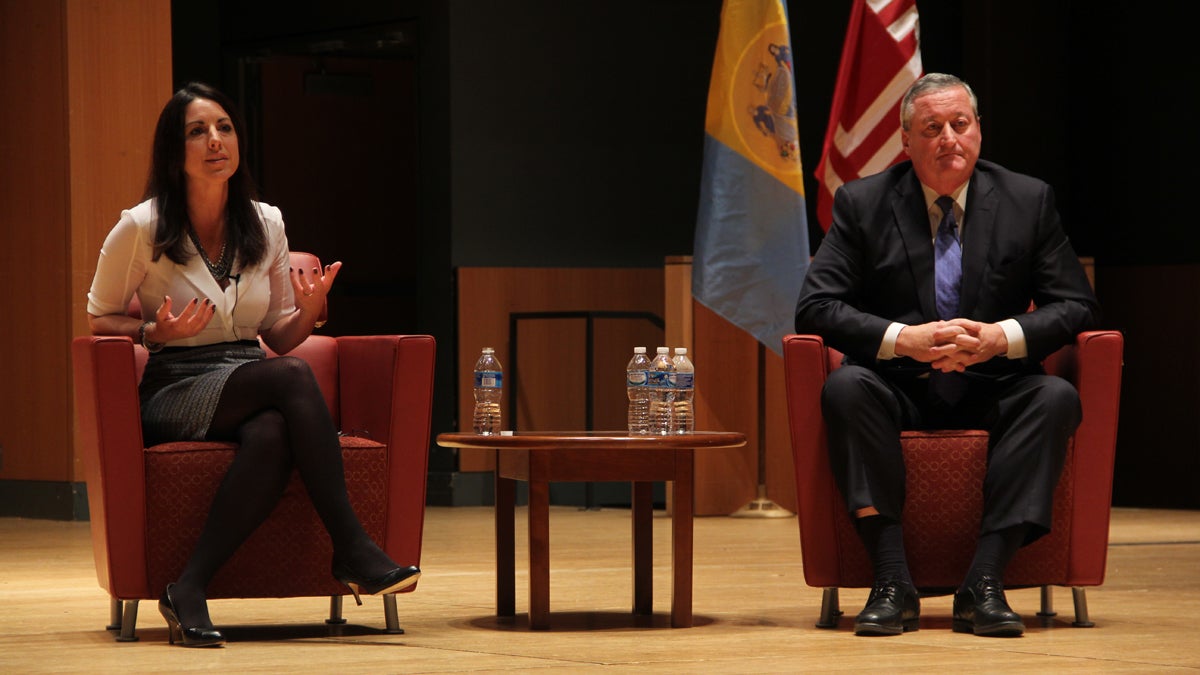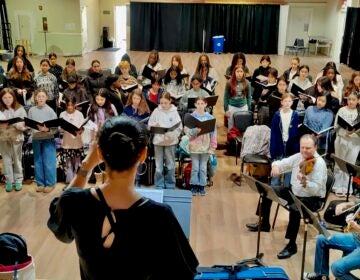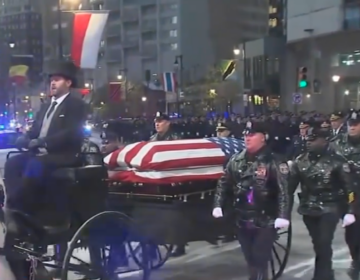Philly mayoral candidates spar over luring new jobs and expanding port

Philadelphia mayoral candidates Melissa Murray Bailey and Jim Kenney debate Monday night at Temple University. (Emma Lee/WHYY)
Philadelphia’s Democratic mayoral nominee Jim Kenney has been careful not to publicly take his party’s 7-to-1 voter registration edge for granted, but things got a bit testy between him and Republican nominee Melissa Murray Bailey during their third debate Monday night.
Philadelphia Inquirer reporters Chris Hepp and Diane Mastrull served as moderators and pushed the candidates to flesh out their plans to deal with the city’s aging infrastructure, a $5 billion public pension liability, and a recovering local economy.
Kenney took a dig at Bailey who wants to lure West Coast- and internationally-based companies to make Philadelphia their East Coast or American headquarters, which she argues would boost the job market and diversify the economy.
“I don’t have to travel to Timbuktu to do that,” said Kenney. He wants businesses in the Philadelphia suburbs to consider opening satellite offices in the city so that the roughly 30 percent of residents who have a reverse-commute could work closer to home.
“I can go out to Malvern and other places and talk to them and offer them with the Chamber of Commerce some incentive, some deal on space, some opportunities for them to come here,” he said.
Bailey, a business executive who lived in Australia and Singapore before moving to Philadelphia three years ago, hit back.
“First, the great news is I don’t have to travel to Timbuktu either,” she said. “I already know a lot of these people so I can just call them up on the phone and talk with them about the opportunities in Philadelphia.”
Bailey also wants to bring down the city’s wage tax by a full percentage point over 10 years. Kenney, who supports more modest wage tax decreases implemented by mayors Rendell, Street and Nutter, refused to critique her plan when invited to do so by the moderators.
The candidates also debated the merits of expanding the Port of Philadelphia as projects to dredge the Delaware River and widen the Panama Canal are almost complete.
Expanding the port, including the Packer Avenue Marine Terminal in South Philadelphia, is a key element of Kenney’s jobs plan, “which means we can train people in maritime skills, unloading ships, driving forklifts, working in warehouses,” he said.
Bailey disagreed.
“When we think about long-term jobs for the city, the port just really isn’t the place we should be investing,” she said, arguing that Philadelphia would not be able to compete with ports in other cities.
The conversation later turned to national politics and the mayoral candidates’ thoughts on the 2016 presidential race. Kenney called the Republican debates a “reality show” and in the sole applause line of the night, he criticized the candidates’ as sexist.
“They would like to see women back in the kitchen with no careers,” he said. “I listen to [Mike] Huckabee and I’m like dude, you’re serious?”
Bailey defended her party, although she has previously tried to distance herself from the image presented by national GOP candidates. She pointed out that the Republican field is more diverse than the Democratic field.
“When I looked at the Democratic candidates I saw all older white people up there,” she said. “When I saw the Republican candidates, I saw a mix of old and young, women and men, African-American, Latino men.”
The debate was hosted by the Philadelphia Media Network (parent company of the Inquirer, Daily News and philly.com) at Temple University’s Performing Arts Center. Independent and third-party candidates Jim Foster, Osborne Hart and Boris Kindij were not invited to participate.
WHYY is your source for fact-based, in-depth journalism and information. As a nonprofit organization, we rely on financial support from readers like you. Please give today.




